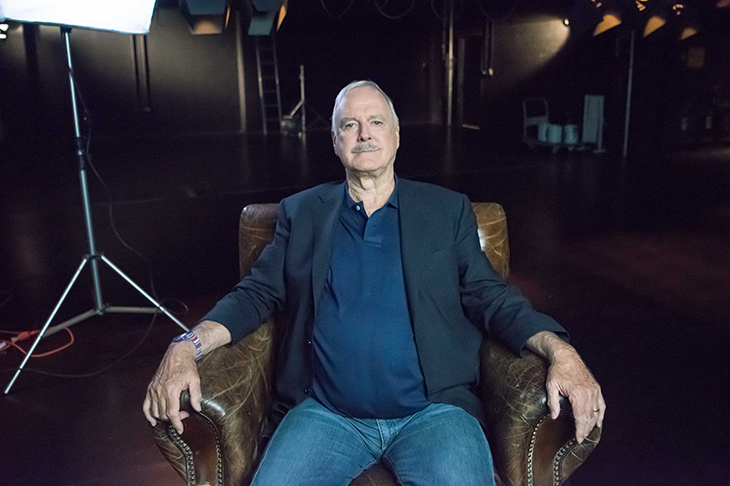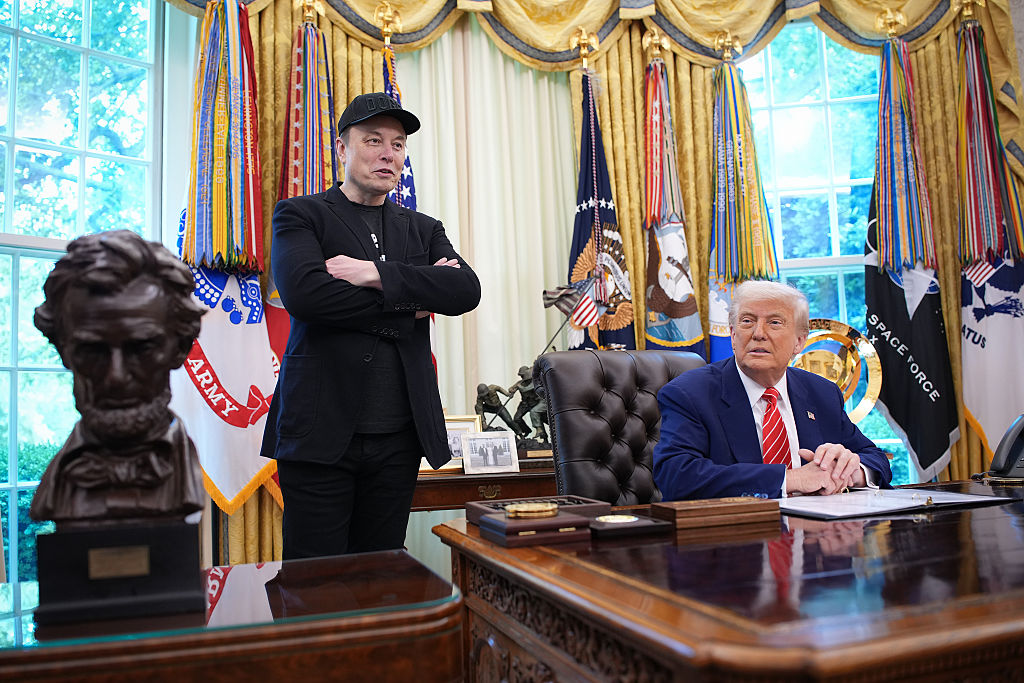As I write these words, I regret to inform you, John Cleese is on his way to being canceled. Now there’s a sentence that straddles a generation gap. Many people very familiar with John Cleese will have only the dimmest idea of what ‘canceled’ means; while people who are all about canceling celebrities will tend not to know what ‘John Cleese’ means. If anything saves him from cancelation, it will be the hope that he can snuggle down and hide in that gap until it’s all over. The cancelers won’t try too hard because they didn’t know who he was in the first place; others will register the row, furrow their brows, and then be distracted by chortling merrily at the thought of Basil Fawlty going to work on his 1967 Austin Countryman with a large tree-branch.
What has he done? He has Said Something On Twitter. ‘Some years ago I opined that London was not really an English city any more,’ he wrote. ‘Since then, virtually all my friends from abroad have confirmed my observation. So there must be some truth in it…’ His problem, obviously, was that in failing to define ‘not English’ he laid himself open to accusations of racism: did he mean, as many assumed, it was full of brown people? This he denied, saying he was being not racist but ‘culturalist’, and making some scattershot but pointed remarks about FGM, knife crime, political correctness and Russian money laundering.
What strikes the casual observer is not the strength or weakness of his argument —there’s not much of an argument there, and he muddles cultural and institutional issues — but his perplexity that people can’t just see what he means. Why is everyone determined to take offense? Everyone understands what English means, don’t they? Something to do with warm beer and cricket and fair play and queues and Anglicanism, presumably; all those things whose traditional association with whiteness is incidental.
As the incoming stepped up, you could see old Cleese blundering about getting crosser and crosser, dedicating much of a day to tweeting words to the effect of ‘but that’s not what I said, you idiot!’. Here he was again, walloping at his Austin Countryman. Evidently irked, he returned to the fray a bit later and it got worse. He said something sarcastic about race being a ‘social construct’ — ‘I think they should inform the Institute of Race Relations, as this may make it harder for them to pursue cases of racial discrimination’ — and was last seen disappearing under a barrage of population geneticists.
I was put in mind of that other grumpy old so-and-so, Richard Dawkins, who complained on Twitter a few years back about getting a jar of honey confiscated at airport security — ‘Bin Laden has won,’ he announced — and became first perplexed and then cross at the avalanche of replies mocking him for the tweet. Eventually, the trolls landed the whale: ‘Do you idiots seriously think I give a damn about my stupid honey? It’s the PRINCIPLE I care about. Get it? Principle, not honey, principle.’ Oh, honey. You’d think he’d have learned from hundreds of people tweeting ‘your (sic) a dick’ at him in response to his baffled complaint that people were tweeting ‘your a dick’ at him that you can’t damn win.
The problem that all this exemplifies is the seductiveness and the peril of common sense: the notion that most things are essentially easy to understand, and that some things are so unarguably obvious that anyone thinking otherwise is nitpicking or showing off to trendies or arguing in plain bad faith. The Cleese/Dawkins vibe, here, is common sense. We all know what English is. We all know what race means. We all know what a real terrorist looks like. If all your friends who don’t live there think London isn’t English, there must be something in that, right? If physical traits are passed on through our DNA, race must be a scientific fact, right? If you’re Richard bloody Dawkins about to get on a plane, your jar of honey isn’t going to have a bloody bomb in it, right?
‘Common sense’ is a concept very popular in politics, and very appealing to the impatient (inasmuch as it presents an intuitive account of the world) and the conservatively minded (inasmuch as common sense favors the status quo). But common sense — which in rhetoric we call argumentum ad populum, and which philosophers disapprove of — changes. It has been common sense that women shouldn’t have the vote. It has been common sense that homosexuality is unnatural. It has been common sense that the natives aren’t ready for self-government. It has been common sense, as in the Flanders and Swann song ‘The Reluctant Cannibal’, that eating your enemies is just what people do: ‘Going around saying “Don’t eat people”… We always have eaten people, always will. You can’t change human nature.’
And it is also common sense that now tends to make the young incomprehensible to the old. While gender-critical feminists duke it out with trans activists over the philosophical distinctions between sex and gender, the social construction of identity and the effects on sex and gender categories of legislative protections and permissions, there’s always someone with a well-stocked larder of common sense who will cut though the folderol and say: ‘That’s a bloke in a bloody frock!’.
Mind you, the one commonsensical thing we can agree on is that when social media has decided you’re fun to mock, no amount of flailing at it will do anything other than worsen your predicament. If I were prescribing a defensive strategy for poor old Mr Cleese — huddling in the generation gap aside — it would be simply to tweet every one of his detractors the words ‘Your a dick’ and leave it there. Common sense, innit.
This article was originally published in The Spectator magazine.

























